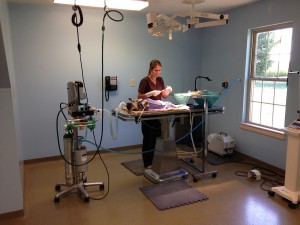All surgeries are maintained on isoflurane gas anesthesia and monitored during surgery with Pulse OX/EKG machines. All surgeries are given pre-operative pain medication at the time of surgery. We also offer pre-anesthesia blood work and post-op pain medications if the owner would like.
We also offer laser surgery for all procedures, for more details click here.
Pre-anesthetic Blood Testing
Our staff understands the concerns you have about placing your pets under general anesthesia. While no anesthetic will ever be 100% safe, there are precautions that can be taken to minimize the risk to our patients, before, during, and after an anesthetic procedure. In addition to our anesthetic monitoring, we are now able to offer in house pre-anesthetic blood work to identify any underlying conditions that may make anesthesia more of a risk to your pet. Pre-anesthetic blood work is quick, simple, and virtually painless. It takes only a small amount of blood and 6-8 minutes to get immediate results. We currently offer two blood-screening panels. Each one is specifically designed to assess vital organs and give us immediate feedback so we can create an anesthetic protocol specifically for your pet. Our staff will discuss the pre-anesthetic blood test with you when you drop off your pet and will help you determine which screen is right for you. We feel that the additional investment in your pets well-being and your piece of mind make our anesthesia the safest that it can be.
Spaying Your Dog Can Save Her Life
Pyometra (“Py-oh-mee-tra”) is a bacterial infection of the uterus that is most often seen in middle-aged female dogs that have not been spayed. Bacteria from the cervix enters the uterus during each heat cycle, possibly creating massive infection over time. Symptoms may or may not occur with pyometra. Symptoms could include vaginal discharge, drinking more water than usual, lethargy, anorexia, fever, vomiting, and/or diarrhea. If a dog has pyometra and is not treated immediately, the uterus may rupture and spill infection into the abdominal cavity, resulting in death. The preferred treatment is to remove the uterus and ovaries (spay). Intravenous fluids are often needed before and after surgery, as well as antibiotics for 1-2 weeks. The only preventative for pyometra is to spay your dog, which we can do, starting at 5 months of age. Is YOUR dog safe?

